News
Imagining future impacts of climate change in Niger and Burkina Faso
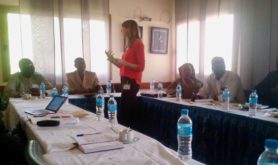
The RE-IMAGINE Roundtable in Niger. Photo: Lucas Rutting
A variety of foresight processes are used in West Africa to imagine a future under climate change, including modeling, participatory scenarios and visioning processes. However, a crucial next step to improve the use of these techniques in policy plans is to augment human and financial resources and improve the coherence of policy goals among ministerial departments and agencies. These were some of the key points raised during the RE-IMAGINE session on anticipatory governance in Niamey, Niger, and in Ouagadougou, Burkina Faso.
RE-IMAGINE, in full ‘re-imagining anticipatory climate governance in the world’s vulnerable regions’, is a research project investigating anticipatory governance processes in Central America, Southeast Asia, South Asia and West Africa. The project is a collaboration between Utrecht University, Wageningen University, the University of Oxford and CCAFS , and is funded by the BNP Paribas Foundation.
Exchanging ideas on how climate change is anticipated in Niger and Burkina Faso
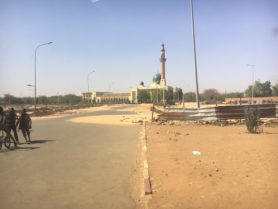
Niamey, Niger. Photo: Karlijn Muiderman
Niger and Burkina Faso are both landlocked countries in West Africa’s dry Sahel zone that are highly vulnerable to climate change. Researchers, policymakers and NGOs in both countries are trying to anticipate and adapt to climate change in this highly complex and insecure context.
In February 2020 RE-IMAGINE researcher Karlijn Muiderman, who has been studying recent foresight processes in West Africa, organized round table sessions in Niger and Burkina Faso to exchange ideas on the use of foresight in policy plans and implementation and discuss RE-IMAGINE findings.
The RE-IMAGINE round tables were linked to CCAFS scenarios workshops led by scenarios researchers Lucas Rutting and Muiderman. In Niger, Rutting and Muiderman teamed up with CGIAR research center ICRISAT, as part of their Science-Policy Platform meetings (Zougmoré et al. 2019). The scenarios workshop – round table combination allowed for in-depth discussion with a multitude of stakeholders on a variety of drivers of future political, security, environmental and socioeconomic change.
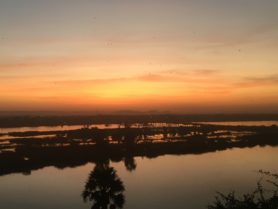
The Niger River. Photo: Karlijn Muiderman
The challenges of an unstable context
Participants of both roundtable discussions highlighted the challenges of an unstable context when planning for a future under climate change. Niger and Burkina Faso are both highly vulnerable to climate change, and desertification is an increasing problem. The countries rank lowest on the Human Development Index. Agricultural production is inefficient, yet the majority of people depend on agriculture for food and income. Food and income are insecure, particularly in the dryer and deserted regions. Rivalry between farmers, pastoralists and nomadic groups are exploited by militant groups and have severely affected livelihoods. Terrorist attacks are increasing, and political stability, economic stability and food security have been severely affected (see e.g. Okafor 2017).
Participants argued that the withdrawal of the government and NGOs from the region due to such issues illustrates how changes in context can completely undermine policy implementation. These future changes are difficult to predict and can only be imagined when a wide variety of plausible future changes are taken into account.
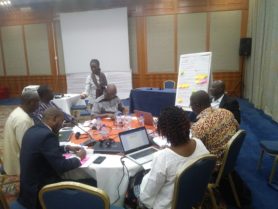
Scenarios workshop in Niamey, Niger. Photo: Lucas Rutting
Foresight often limited to simulation models
During the sessions, policymakers, researchers and representatives from pastoralist communities mentioned a range of methods, tools and processes that they have engaged with to explore future impacts of climate change. This is most often an exploration of the impacts of future climate change on food availability and economic development through models that simulate crop production and yields under different conditions like fertilizers, humidity, temperature.
Models are generally considered good decision-making tools. Stakeholders understood that rapidly changing contexts, like rapid population growth and precarious security situation in Niger, can mean a plan no longer effectively targets the intended people, regions or crops. A lack of data availability is also considered problematic, decreasing scientific certainty.
Scenarios considered more democratic
When participants are familiar with them, participatory scenarios were valued for including a wider variety of future drivers of change, integrating more of the unforeseen and unexpected. The method is considered more democratic as it takes more perspectives and interests of a diverse group of stakeholders into account. It is increasingly used in policy making, according to the participants in Niger, although it’s a costly and time-consuming process. This said, in policy documents the translation outcomes of participatory scenario work into the policy is rarely transparently reported.
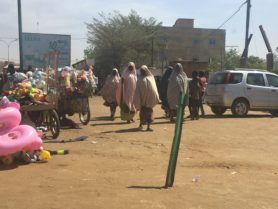
Niamey, Niger. Photo: Karlijn Muiderman
Barriers to policy implementation
In Niger, the Nigeriens Nourishing Nigeriens Initiative (3N Initiative) and the National Adaptation Plan are considered to provide a key framework for engaging with the future of climate change. Although these plans are highly valued, the conclusion was that implementation is limited. With support of international donors, strong policies are drafted, yet action plans for implementation are not nearly as good.
Foresight processes poorly linked to policy processes
There were similar arguments for the implementation of foresight processes in policy plans and action plans. In Niger participants discussed a lack of human and financial resources, as well as conflict and lack of policy coherence between ministerial departments as hindering the implementation of recommendations from foresight processes.
Human and financial resources needed for successful use of foresight methods
According to the participants, a crucial next step would be to invest in human and financial resources at the different ministerial departments to better understand and make use of foresight methods. Another key point for improvement is the better alignment and integration of the multitude of initiatives, projects and processes undertaken to anticipate and plan for future climate change, which are now parallel processes following their own internal logic.
The recommendations from this policy roundtable as well of those from the other RE-IMAGINE regions will be published in an upcoming paper.
Karlijn Muiderman is project officer and lead researcher on the RE-IMAGINE project. She is based at The Copernicus Institute of Sustainable Development, Utrecht University and Wageningen University.

